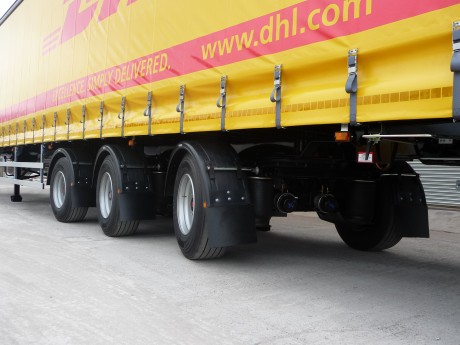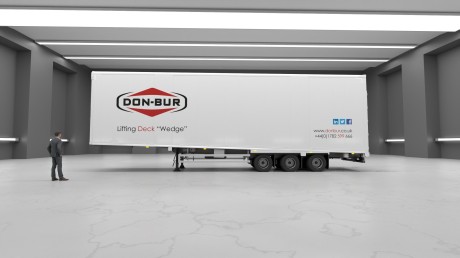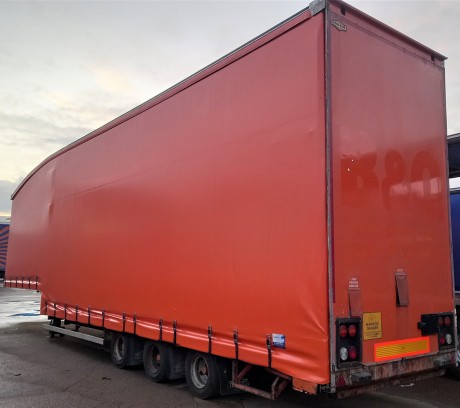Trailer dimensions are governed by UK domestic law through the Road Vehicles (Construction and Use) Regulations 1986 (as amended), alongside retained elements of EU-derived legislation such as SI 2020/1393 and SI 2022/59, which mirror aspects of EU Regulation 2019/1892 on vehicle dimensions and aerodynamic improvements.
Trailer Width
- 2550mm for standard (dry freight) trailers
- 2600mm for temperature-controlled trailers with insulated bodywork
Trailer Length
Trailer length is constrained by two critical measurements:
- Kingpin to rear: must not exceed 12.0m
- Forward swing radius (kingpin to foremost point of trailer): must not exceed 2.040m
Due to these parameters, overall trailer length can vary depending on body type and manufacturer design. For example:
- Curtainsiders typically measure up to 13.7m overall
- Box van trailers are usually around 13.6m overall
By altering the front bulkhead shape, particularly the swing radius, manufacturers can optimise length within legal bounds.
Overall Combination Length
The maximum legal tractor/trailer combination length is 16.5m. This means the tractor unit, fifth wheel position, and trailer must be configured together to stay within this limit. A longer tractor cab or a fifth wheel set further rearward will reduce the allowable trailer length accordingly.
Trailer Height
- In the EU, trailer height is limited to 4.0m
- In the UK, there is no legal maximum height, following a long-standing derogation
UK trailers can therefore be designed to any practical height. For example, double deck trailers often reach up to 4.95m to maximise internal capacity while maintaining clearance under unmarked bridges.
Longer Semi-Trailers (LSTs)
The use of Longer Semi-Trailers (LSTs) became legal for general use from 31st May 2023, following amendments to the STGO framework. They allow:
- Trailer length up to 15.65m
- Maximum overall combination length of 18.55m
This typically permits up to 4 additional UK pallets per deck — allowing a double deck LST to carry up to 60 pallets.
Additional Length for Aerodynamic Devices and Elongated Cabs
Under Commission Regulation (EU) 2019/1892 (mirrored in GB via SI 2020/1393), additional length is permitted to improve aerodynamic efficiency or safety, provided it does not increase usable load space.
Permitted extensions:
- Rear of trailer: up to 500mm (e.g. boat tails, flaps)
- Trailer sides: up to 25mm per side, bringing total width to 2600mm
- Front of tractor unit: up to 200mm for elongated aerodynamic cabs
Following a 2022 amendment to UK Construction and Use Regulations (SI 2022/59), vehicles that exceed traditional length limits for these reasons are now permitted on UK roads, provided they:
- Are marked "96/53/EC Article 9a Compliant"
- Continue to meet turning circle regulations (inner: 5.3m, outer: 12.5m)
Note on BEVs:
While many battery-electric vehicles (BEVs) feature longer cabs due to battery placement or streamlined design, there is currently no separate legal exemption for BEVs based on drivetrain alone. To qualify for additional length, BEV designs must still meet the same aerodynamic or safety criteria as conventional vehicles.
Longer Heavier Vehicles (LHVs)
LHVs refer to "B-double" combinations — a tractor unit pulling a special intermediary trailer (with its own fifth wheel), which in turn tows a full-length trailer.
- Typical length: 25.25m
- Requires steered axles to meet turning regulations
LHVs are not currently legal in the UK, but they are under review by the DfT.
We’d love to hear from you – get in touch today!







